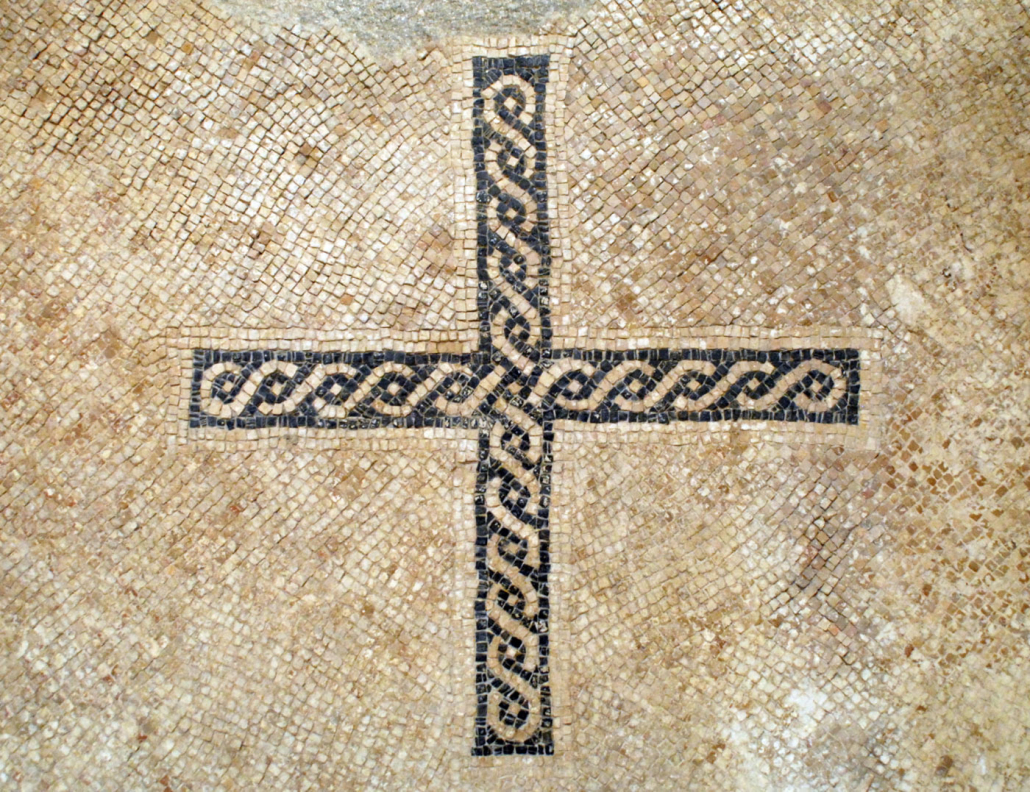Image: Mosaic cross design (https://www.pappaspatristicinstitute.com).
‘The Word of the Cross’
Andrew Collis
Good Friday, Year B
Psalm 22; John 19:17-42
The Cross is ugly, terrible – an instrument of torture. It symbolises the frightening might of empire – as threat, weight, trauma.
We can reflect on the presence and influence of the Cross in our world, history, lives … our awareness of imperial and colonial violence … our experience of fear and anger, resistance, sorrow – for ourselves and for one another …
The Cross, of course, is a Christian symbol … used and abused over centuries … inspiring Christlike faith as well as foolish triumphalism.
It may also be seen as a sign of crisis – historical, cultural, social – as site of creative expression we call scripture, holy writing or storytelling. Under the sign or pressure of this Cross, we may come to see, God’s people write and edit, collate, share, retell and sing Torah, prophecy, apocalyptic, gospel …
Salvation history is written amid the ruins of temple and city, amid the heartbreak of family separation, amid violence, exilic and post-exilic demoralisation … in the sixth and fifth centuries BCE, in the first and second centuries of the Common Era.
Sister Patricia Stevenson’s book of paraphrases is called Psalms and Other Songs from a Pierced Heart. That’s an apt title for much if not all biblical writing.
There is a close correlation between Cross and Word, then, so that reading the Bible entails discernment of sadness, guilt, anger, hatred, self-pity, self-aggrandisement, resentment, vengeance … as well as – like leaven in the loaf – startling grace, forgiveness, faith, hope and love. This is happening, for those with eyes to see – revelation – on every page, in book after book …
“For the Word of the Cross is complete absurdity to those who are headed for ruin, but to us who are experiencing salvation, it is the power of God” (1 Corinthians 1:17-18).
Theologians of the Cross venerate a site of wisdom, resistance, new life – anticipate new words spoken and sung … in concert with others, with all who know the song of faith in ruins.
As we realise/confess the many ways our lives and imaginations are implicated in imperial projects – our own hearts working through sadness, guilt, anger, hatred, self-pity, self-aggrandisement, resentment, vengeance – the “power of God” may open for us a space of freedom, emptiness (good emptiness) …
And the Seven Last Words of Christ are emblematic of this power – beauty or glory.
As we venerate the Cross – walking towards it, touching the sign, acknowledging a site of wisdom, resistance and new life … praying with all who suffer cruel isolation, demoralisation – we recall these words … creative, impassioned – like leaven in the loaf, like salt and light, in ink like blood – words of startling grace, forgiveness, faith, hope and love.
“Abba, forgive them. They don’t know what they are doing” (Luke 23:34).
To the “good thief”: “The truth is, today you’ll be with me in paradise” (Luke 23:43).
To Mary: “Here is your son”; and to the Beloved Disciple: “Here is your mother” (John 19:26-27).
“My God, my God, why have you forsaken me?” (Mark 15:34).
To all: “I am thirsty” (John 19:28).
“It is finished” (John 19:30).
“Abba, into your hands I commit my spirit” (Luke 23:46).
As a theologian of the Cross, is there a new word for you today – a spoken word, a cry in the dark, a song in the wind – a word remembered or anticipated … in concert with another who knows the song of faith in ruins?
You might like to touch the Cross and offer a silent prayer, or share aloud a new word …
Let us complete the homily together … Amen.




